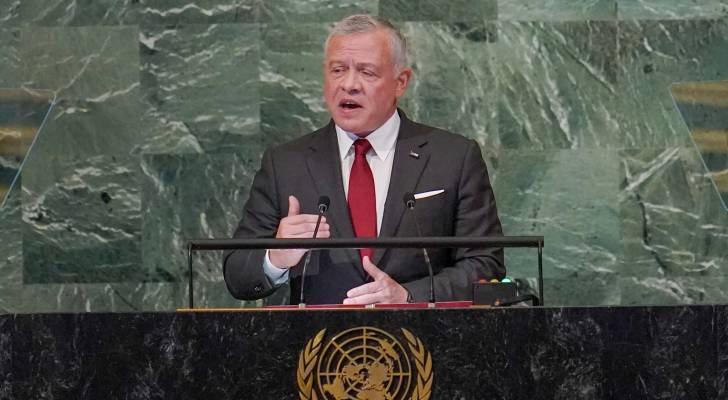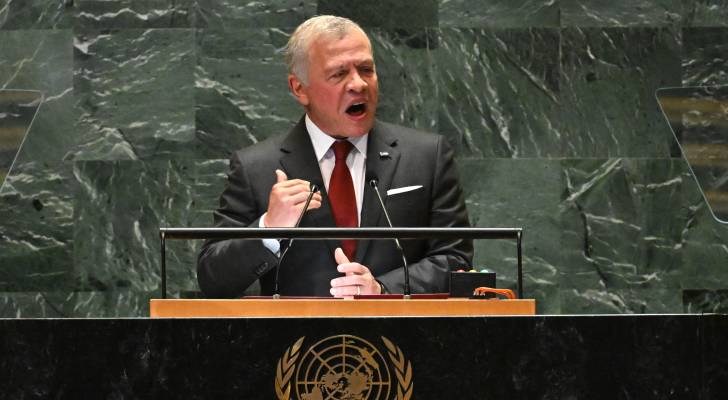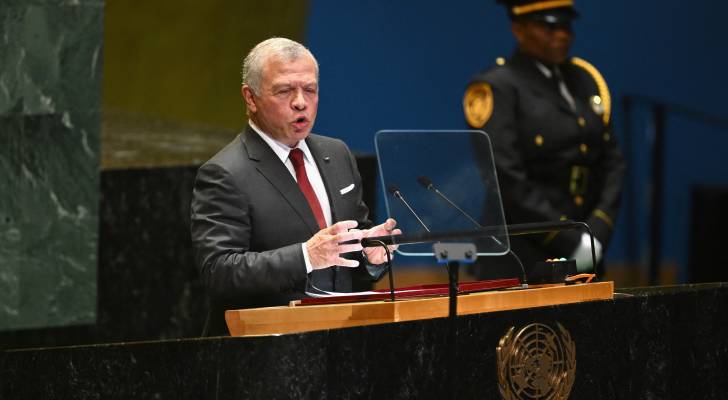His Majesty King Abdullah II delivers Jordan’s address at the 79th Session of the General Assembly of the United Nations
King urges countries to join Jordan in enforcing international Gaza Humanitarian Gateway
His Majesty King Abdullah II on Tuesday called on all countries to join Jordan in enforcing an international Gaza Humanitarian Gateway.
Delivering Jordan’s address at the 79th Session of the United Nations General Assembly, His Majesty said the gateway would be “a massive relief effort to deliver food, clean water, medicine, and other vital supplies to those in desperate need”.
“Humanitarian aid should never be a tool of war,” the King continued in his speech, attended by His Royal Highness Prince Hashem bin Abdullah II.
His Majesty noted that almost a year into the war on Gaza, the world has failed politically, “but our humanity must not fail the people of Gaza any longer”.
The King urged the international community to establish a protection mechanism for the Palestinians across the occupied territories.
Turning to the dangerous developments in Lebanon, His Majesty said the escalation in Lebanon has to stop, stressing that no country in the region benefits from escalation.
“Our United Nations is facing a crisis that strikes at its very legitimacy”, said the King, stressing that the harsh reality many see is that some nations are above international law.
This Israeli government, His Majesty said, has killed more children, more journalists, more aid workers, and more medical personnel than any other war in recent memory.
The King stressed that the unprecedented scale of terror unleashed on Gaza is beyond any justification.
His Majesty warned of extremists who are taking the region to the brink of an all-out war, including those who continue to propagate the idea of Jordan as an alternative homeland.
“We will never accept the forced displacement of Palestinians, which is a war crime,” the King affirmed, noting that consecutive Israeli governments have rejected peace and chosen confrontation instead.
His Majesty stressed that Palestinians have borne more than 57 years of occupation and oppression, but the brutality of the war on Gaza has forced the world to look closer.
Over the past years of the Palestinian-Israeli conflict, the King said the global community had taken the path of least resistance, paying lip service to the two-state solution
“My father was a man who fought for peace to the very end. And, like him, I refuse to leave my children, or your children, a future we have given up on,” His Majesty concluded.
Following is the full text of His Majesty’s speech:
“In the name of God, the Compassionate, the Merciful
Mr President,
Mr Secretary General,
Your Excellencies:
Over the past quarter-century, I have stood at this podium amidst regional conflicts, global upheavals, and humanitarian crises that have profoundly tested our global community.
It often feels that there was not a moment when our world was not in turmoil. And yet, I cannot recall a time of greater peril than this.
Our United Nations is facing a crisis that strikes at its very legitimacy and threatens a collapse of global trust and moral authority.
The UN is under attack—literally and figuratively.
For nearly a year, the sky-blue flag flying over UN shelters and schools in Gaza has been powerless to protect innocent civilians from Israeli military bombardment.
UN aid trucks sit motionless just miles away from starving Palestinians. Humanitarian workers who proudly wear the emblem of this institution are disparaged and targeted. And the rulings of the UN’s International Court of Justice are defied, its opinions disregarded.
So it’s no surprise that both inside and outside this Hall, trust in UN’s cornerstone principles and ideals is crumbling.
The harsh reality many see is that some nations are above international law, that global justice does bend to the will of power, and that human rights are selective; a privilege to be granted or denied at will.
We cannot stand for that, and we must recognise that undermining our international institutions and global frameworks is one of the gravest threats to our global security today.
Ask yourselves, if we are not nations united in the conviction that all people are equal in rights, dignity, and worth, and that all countries are equal in the eyes of the law, what kind of world does that leave us with?
Your Excellencies,
The attacks of October 7 on Israeli civilians last year were condemned by countries all over the world, including Jordan, but the unprecedented scale of terror unleashed on Gaza since that day is beyond any justification.
The Israeli government’s assault has resulted in one of the fastest death rates in recent conflicts, one of the fastest rates of starvation caused by war, the largest cohort of child amputees, and unprecedented levels of destruction.
This Israeli government has killed more children, more journalists, more aid workers, and more medical personnel than any other war in recent memory.
And let us not forget the attacks on the West Bank. There, since October 7, the Israeli government has killed more than 700 Palestinians, among them, 160 children. Palestinians held in Israeli detention centres exceed 10,700, including 400 women and 730 children—730 children. Over 4,000 Palestinians have been forced from their homes and lands. Armed settler violence has surged. And entire villages have been displaced.
And in Jerusalem, flagrant violations of the historical and legal status quo at Muslim and Christian Holy Sites continue unabated, under the protection and encouragement of members of the Israeli government.
To be clear, this is in the West Bank, not Gaza.
Almost 42,000 Palestinians have been killed since October 7.
So is it any wonder that many are questioning, how can this war not be perceived as deliberately targeting the Palestinians?
The level of civilian suffering cannot be written off as unavoidable collateral.
I grew up a soldier, in a region that is all too familiar with conflict. But there is nothing familiar about this war and the violence unleashed since October 7.
In the absence of global accountability, repeated horrors are normalised, threatening to create a future where anything is permitted anywhere in the world. Is that what we want?
Now is the time to ensure the protection of the Palestinian people. It is the moral duty of this international community to establish a protection mechanism for them across the occupied territories. This will guarantee the safety of Palestinians and Israelis from extremists who are taking our region to the brink of an all-out war.
That includes those who continue to propagate the idea of Jordan as an alternative homeland. So let me be very, very clear—that will never happen. We will never accept the forced displacement of Palestinians, which is a war crime.
No country in the region benefits from escalation. We have seen that clearly in the dangerous developments in Lebanon over the past few days. This has to stop.
For years, the Arab world has extended a hand to Israel through the Arab Peace Initiative, offering full recognition and normalisation in exchange for peace. But consecutive Israeli governments, emboldened by years of impunity, have rejected peace and chosen confrontation instead.
Impunity gathers force. Left unchecked, it gains momentum.
Palestinians have borne more than 57 years of occupation and oppression. During this time, the Israeli government has been allowed to cross one red line after another.
But now, Israel’s decades-long impunity is becoming its own worst enemy.
And the consequences are everywhere.
The Israeli government has been accused of genocide at the ICJ. Expressions of outrage at its conduct are echoing around the world. Cities everywhere have seen mass protests, and calls for sanctions are growing louder.
International frustration with Israel has long been mounting, but it has never been more exposed.
For decades, Israel has projected itself as a thriving Western-styled democracy in the Middle East.
But the brutality of the war on Gaza has forced the world to look closer.
Now, many see Israel through the eyes of its victims. And the contradiction, the paradox, is too jarring.
The modern, advanced Israel admired from afar, and the Israel that Palestinians have experienced firsthand simply cannot co-exist. Israel will eventually be entirely one or the other.
That is the choice its leaders and its people will have to make. To live by the democratic values of freedom, justice, and equality for all, or to risk further isolation and rejection.
Over and over, we have watched Israel try to achieve security through military means. Each escalation is followed by a pause, until the next, deadlier one.
And for years, the global community has taken the path of least resistance—accepting the status quo of the ongoing military occupation of Palestinians, all the while paying lip service to the two-state solution.
But it has never been more evident that the current status quo is untenable. And, as the International Court of Justice’s advisory opinion underscored two months ago, it is unequivocally illegal.
The Court’s opinion bears a moral imperative to us all. The obligation it carries is one that our nations cannot afford to ignore—for the sake of our world, as well as the future for Palestinians and Israelis alike.
Because both peoples deserve to live their lives in dignity, free of violence and fear.
And the only way to achieve that is a just peace, one grounded in international law, justice, equal rights, and mutual recognition.
That is something we, as nations and people everywhere, can and must unite around.
Your Excellencies,
The world is watching, and history will judge us by the courage we show.
And it’s not just the future that will hold us accountable, so will the people of the here and now.
They will judge whether we, as the United Nations, will surrender to inaction, or will fight to uphold the principles that anchor this institution and our world.
Right now, they are asking whether we will stand by as parents watch their children waste away, as doctors watch their patients die for lack of basic medical supplies, and as more innocent lives are lost, because the world failed to act.
This war must end. Hostages and detainees must return home. But every day we wait is one day too long for far too many.
So I call on all countries to join Jordan in enforcing an international Gaza Humanitarian Gateway—a massive relief effort to deliver food, clean water, medicine, and other vital supplies to those in desperate need. Because humanitarian aid should never be a tool of war.
Whatever our politics, one truth is undeniable—no people should have to endure such unprecedented suffering, abandoned and alone. We cannot surrender the future to those who thrive on division and conflict.
I urge all nations of conscience to unite with Jordan in the critical weeks ahead on this mission.
Almost a year into this war, our world has failed politically, but our humanity must not fail the people of Gaza any longer.
Echoing the words of my father from 64 years ago, at the 15th session of the General Assembly, I pray that this community of nations may have the courage to decide wisely and fearlessly, and will act with the urgent resolve that this crisis and our conscience demand.
My father was a man who fought for peace to the very end. And, like him, I refuse to leave my children, or your children, a future we have given up on.
Thank you.”
The Jordanian delegation at the 79th Session of the UNGA included Deputy Prime Minister and Foreign Minister Ayman Safadi, Director of the Office of His Majesty Alaa Batayneh, and Jordan’s Permanent Representative to the UN Mahmoud Hmoud.






